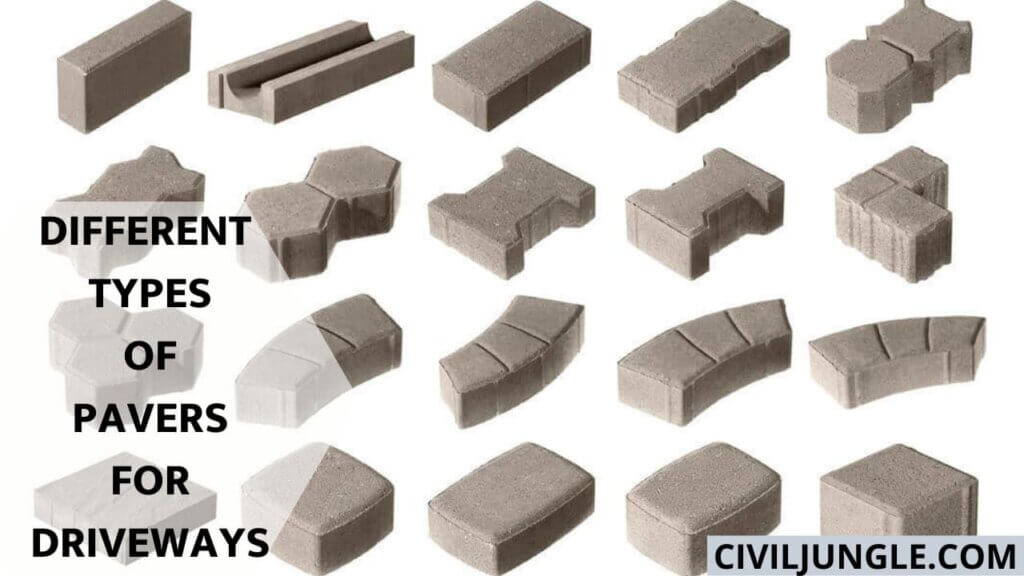What Are Pavers?
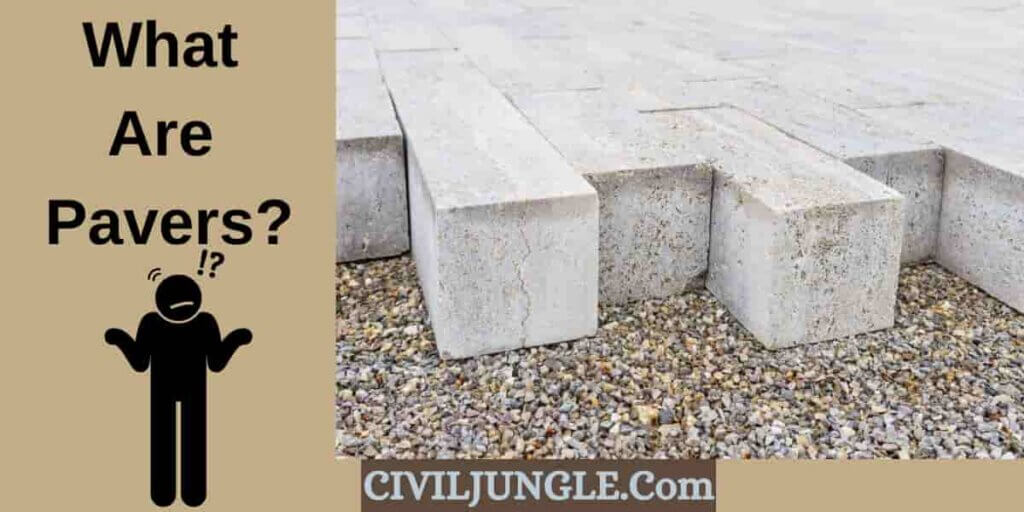
Pavers are generally blocks or slabs which made from different materials like concrete, marble, brick, flagstone, porcelain, etc. Pavers are one of the best substitute for concrete. It also has an interlocking system which makes them a more durable and long-lasting material.
What Are Pavers Used For?
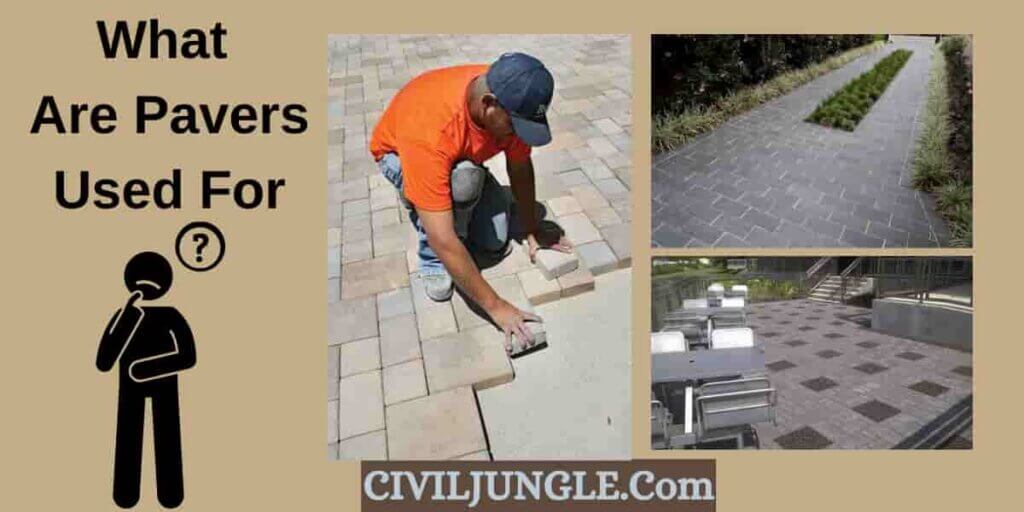
Pavers are generally used for the exterior purpose but there are some places where pavers are widely used, those are-
- Pool decks
- Fire pits
- Driveways
- Planters
- Patios
- Walkways
Different Types of Pavers for Driveways
There are different types of pavers are used in the construction, those are-
1. Brick Pavers (Clay)
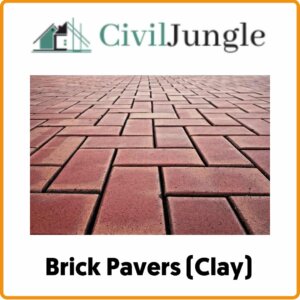
Brick pavers are used for paver material form long time. Brick pavers are made from moulded clay and burned in a kiln. After that it’s ready for driveway usage. Brick pavers are perfect substitute for concrete pavers.
- Pros of Brick Pavers: It is available in many colours and shapes. We can use it with different shapes and patterns, it creates a good visual effect. This paver are totally made by natural product and it’s totally eco-friendly.
- Cons of Brick Pavers: Brick pavers are very brittle material so cracks are easily determined and it requires frequent maintenance and a strong base for long life.
2. Concrete Pavers
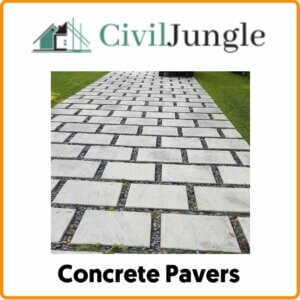
Concrete pavers are of different sizes and shapes but it is generally available in rectangular shapes. This is one of the popular driveway pavers and it’s available in various sizes, colours and textures. Here you can modify it and provide natural looks.
- Pros of Concrete Pavers: It’s easy to install and available in different colours, shapes, sizes. The raw material of concrete pavers are very cheap; so, the product cost is also low.
- Cons of Concrete Pavers: Concrete pavers are artificially cultured; so, it has high chance of fading. High temperature is the cause of the crack and it needs high maintenance because of low longevity.
3. Bluestone Pavers
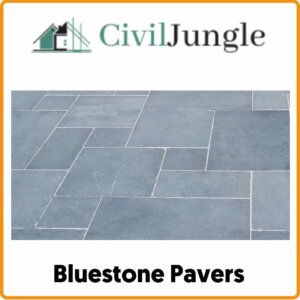
Bluestone is widely used in recent times. It’s a variant of sandstone. It is available in the market with a wide range shapes & colours. Bluestones provide elegant and classy looks.
- Pros of Bluestone Pavers: Bluestone can be matched with other paving materials. It’s very durable and it can be shaped with any type. Bluestones come with different types of colours, in which royal blue is a very special and elegant colour.
- Cons of Bluestone Pavers: Counterfeits bluestones are also sold in the market. Bluestones are a little bit costly materials.
4. Flagstone Pavers
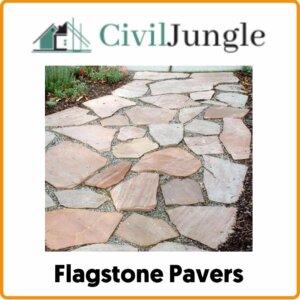
Flagstone pavers are widely used and it is a sedimentary rock type. This type of stone has a unique shape and it creates a unique puzzle shape. Flagstone pavers are thinner pavement than concrete or brick pavement.
- Pros of Flagstone Pavers: The longevity of flagstone is very high and it has a non-slippery surface texture. It is available in many colours, shapes and sizes; among them, grey and hue is the most popular colour. You can also modify it according to your choice but flagstone is a naturally formed stone; so, it also has a beautiful and unique finish.
- Cons of Flagstone Pavers: It’s very difficult to collect the same type of flagstone and generally it has a higher costs because of mining and transportation cost.
5. Marble Pavers
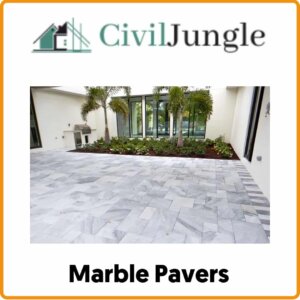
Marbles are one of the most expensive and beautiful pavers, they also have some unique patterns and are used for commercial and residential purposes. It provides an elegant look and is formed by limestone.
- Pros of Marble Pavers: It is highly durable and the longevity of this is very high. It has a smooth and elegant finish. Marble has unique patterns and finishes.
- Cons of Marble Pavers: Marble is a good heat conductor and it transmits heat very easily and the room gets a high temperature. It gets discoloured by some acids or other chemicals.
6. Travertine Pavers
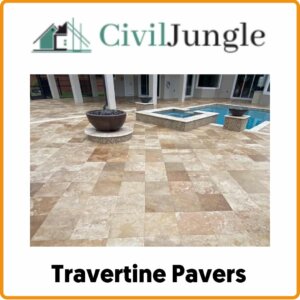
These are basically sedimentary rocks that have natural texture and beauty. Travertine pavers are appropriate for flooring and outdoor landscaping purpose. It is appropriate for pools, patios, countertops, etc.
- Pros of Travertine Pavers: It is available in different colour types and it is cheaper than marble. Travertine pavers are very durable and there is no chance of discolouration. It insulates the heat that’s why it keeps cool the room in the hot season.
- Cons of Travertine Pavers: It is so much heavier; so, construction cost also gets higher. It is very sensible for acids and shows some unwanted strains in that.
7. Porcelain Pavers
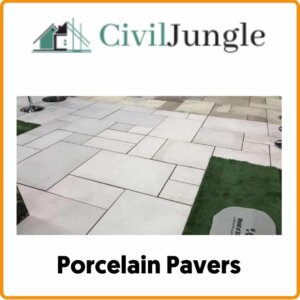
It is an artificial product which is treated with high temperatures. Porcelain is a non-porous material and it is used for interior & exterior purpose but generally used in pool deck areas or wet areas.
- Pros of Porcelain Pavers: Porcelain pavers are not very costly like others because it’s made with natural products like granite, slate, marbles, etc. It does not need too much maintenance & the cleaning process is also very easy. It comes with different colours and absorbs less amount of moisture.
- Cons of Porcelain Pavers: In those places with harsh weather like frost, there porcelain is not perfect for a driveway.
8. Cobblestone Pavers
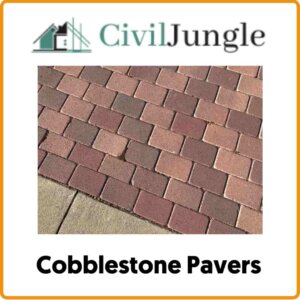
These types of pavers are very durable and strong. These are generally made from granite stone but sometimes basalt, sandstone and limestone are also the sources of cobblestone. It provides an attractive look to the house.
- Pros of Cobblestone Pavers: It is a very long-lasting product and need very little maintenance, sometimes it needs two or three maintenance per year. It is available in the market in a wide range of colours.
- Cons of Cobblestone Pavers: The installation of cobblestone pavers are time-consuming process and require more labour. The price of these are too expensive with respect to the other pavers.
9. Rubber Pavers
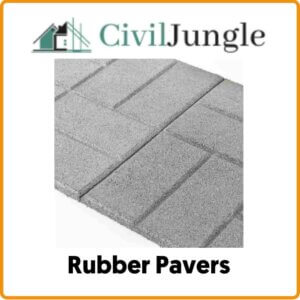
This is a modern creation and it’s made from recycled material. Rubber pavers are eco-friendly, affordable and can bear wear & tear easily. It’s not too good to bear solar heat.
- Pros of Rubber Pavers: Rubber pavers are made from old tyres; so, it’s a recycled and eco-friendly product. They are excellent in shock absorbance and slip resistance. In this, there is no chance of cracking.
- Cons of Rubber Pavers: This type of paver is new in the market, that’s why it’s very difficult to determine the lifespan of rubber pavers. These are available in different colours but not attractive as others.
10. Plastic Pavers
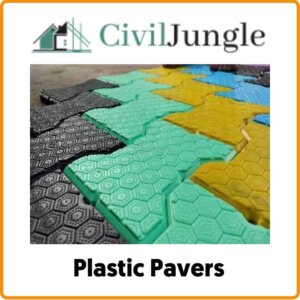
Plastic pavers are produces from recycled plastic products. It is new in the market.
- Pros of Plastic Pavers: This is a recycled product that’s why it reduces the number of plastics around the world. It comes in the market with wide range of varieties.
- Cons of Plastic Pavers: It requires recycling and shaping machines but those are very expensive and not much durable as stone or concrete pavers.
Frequently Asked Questions (FAQs)
What Are Pavers Made Of?
Pavers can be made from a variety of materials including concrete, brick, marble, flagstone, bluestone, travertine, porcelain, cobblestone, rubber, and plastic. Each material has unique characteristics that make it suitable for different applications.
What Are the Advantages of Using Pavers Over Concrete?
Pavers offer several benefits over traditional concrete, including better durability, aesthetic versatility, ease of repair, and an interlocking design that enhances stability and reduces cracking.
Can Pavers Be Used for Indoor Applications?
Yes, pavers can be used for both indoor and outdoor applications. For indoor use, materials like marble, porcelain, and some types of flagstone are popular. For outdoor use, options like brick, concrete, bluestone, and travertine are commonly used.
How Do I Choose the Right Type of Paver for My Project?
Choosing the right paver depends on factors such as the location (indoor or outdoor), climate, desired aesthetics, and budget. Consider the durability, maintenance needs, and visual appeal of each paver type in relation to your specific project requirements.
What Maintenance Do Different Types of Pavers Require?
Maintenance varies by material:
- Brick Pavers: Regular cleaning and occasional sealing.
- Concrete Pavers: Periodic cleaning and sealing to prevent fading and staining.
- Bluestone Pavers: Minimal maintenance, occasional sealing to prevent stains.
- Flagstone Pavers: Requires sealing to prevent staining and occasional cleaning.
- Marble Pavers: Needs regular sealing and careful cleaning to avoid damage from acids.
- Travertine Pavers: Regular cleaning and sealing; avoid acidic substances.
- Porcelain Pavers: Low maintenance, easy cleaning.
- Cobblestone Pavers: Minimal maintenance; occasional resetting of loose stones.
- Rubber Pavers: Low maintenance, but can be affected by sunlight.
- Plastic Pavers: Low maintenance, but may need replacement if damaged.
Are Pavers a Good Option for Driveways?
Yes, many types of pavers, including concrete, brick, and cobblestone, are excellent for driveways due to their durability and aesthetic appeal. Choose pavers that can withstand heavy traffic and environmental conditions.
How Do I Install Pavers?
Paver installation typically involves preparing the base, laying the pavers in the desired pattern, and filling the joints with sand or other materials. Proper installation ensures long-term durability and performance.
Can Pavers Be Repaired or Replaced Individually?
Yes, one of the advantages of pavers is that they can be replaced individually if damaged, without needing to redo the entire surface. This is often easier and more cost-effective than repairing concrete surfaces.
Are Pavers Environmentally Friendly?
Many pavers are eco-friendly, especially those made from recycled materials such as rubber or plastic. Natural stone pavers like bluestone and flagstone are also environmentally friendly as they are sourced from natural resources.
How Do I Clean and Maintain My Pavers?
Cleaning and maintenance depend on the type of paver. Generally, you should sweep regularly, use appropriate cleaners for stains, and apply sealants as needed. Follow the manufacturer’s recommendations for the best results.

